Connecticut Joins National Popular Vote Initiative
Eleven states plus DC, who have 172 of the 270 electoral votes needed to elect a President, are now part of the compact.
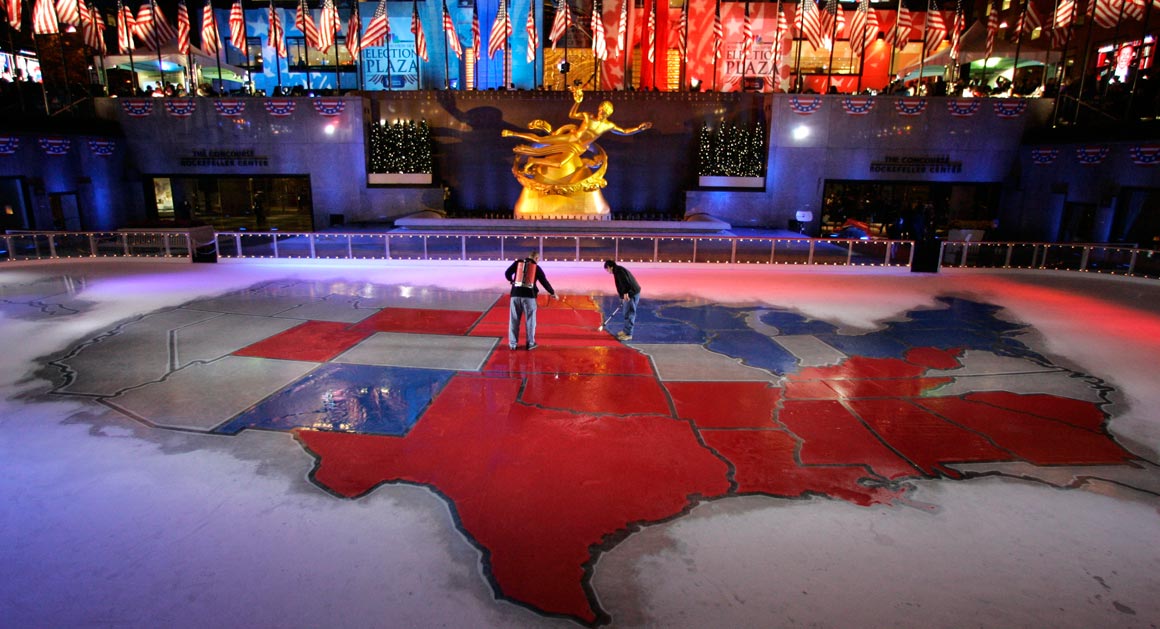
Connecticut Post (“Popular vote for president passes General Assembly“):
The General Assembly on Saturday agreed to join a compact with 10 other states to use the national popular vote to elect a president.
“When you change our system, it takes thoughtful debate and moments when people have to think long and hard,” said Senate Majority Leader Bob Duff, D-Norwalk.
“For me, what is at the heart of the legislation is it provides people confidence that their vote counts,” Duff said.
The Senate voted 21-14 to join a National Popular Vote Compact. The states in that group agree to allocate their Electoral College votes to the presidential candidate who wins the national popular vote, rather than based on who won their state.
But the new system will not kick in until states joining the compact represent the 270 electoral votes needed to become president. Currently, the coalition has 165 electoral votes — 172 when Connecticut’s seven Electoral College votes are included.
The Democratic controlled House last week voted 77-73 to join the compact. The bill now goes to Gov. Dannel P. Malloy for an expected signature.
“The National Popular Vote compact will ensure an equal vote for every American citizen, regardless of which state they happen to live in,” Malloy said on Saturday.
[…]
California, Hawaii, Illinois, Maryland, Massachusetts, New Jersey, New York, Rhode Island, Vermont and Washington state — along with Washington, D.C. — have joined the compact.
This movement, which I first wrote about a dozen years ago, has progressed quite slowly. New York, the tenth state to join the compact, did so way back in 2014. So, it’s taken four years and the election of yuuge popular vote loser Donald Trump to add one measly state.
Amusingly, the debate in Connecticut demonstrates how poorly Americans understand their political system:
State Sen. Mae Flexer, D-Killingly, argued that the electoral college is outdated and a popular vote would attract more interest and participation.
“If the compact was in effect, the campaigns would be conducted in a different manner,” Flexer said.
“President Trump has said he would have campaigned differently,” Flexer said “This would increase turnout in a state where people thought the outcome was a foregone conclusion.”
State Sen. Michael McLachlan, R-Danbury, disagreed, and gave the Senate a lengthy lecture on constitutional history, the Founding Fathers and why the electoral college was put in place.
“If you switch to national popular vote and I’m a candidate for president and I’m a Democrat, I’m going to plant my team in California, the upper Midwest, New York City and Philadelphia,” McLachlan said.
“I’m going to target all those Blue areas,” he continued. “That’s why the Founding Fathers decided they don’t want what we are talking about here. There is no more relevance for small parts of the country. The Democrats go to where the blue is, and the Republicans go to where the red is, and everyone else goes to sleep.”
But Flexer said the shortcoming of the Electoral College is that attention is given only to so-called battleground states.
“States like Connecticut receive no attention, and Oklahoma receives no attention because it is deemed Republican,” Flexer noted. “This will shift how they campaign for president and will make sure all states are engaged in the election.”
The Framers did not create the Electoral College to influence the way candidates campaigned for office; indeed, it was to prevent campaigning. Alexander Hamilton explained their reasoning in Federalist 68:
It was desirable that the sense of the people should operate in the choice of the person to whom so important a trust was to be confided. This end will be answered by committing the right of making it, not to any preestablished body, but to men chosen by the people for the special purpose, and at the particular conjuncture.
It was equally desirable, that the immediate election should be made by men most capable of analyzing the qualities adapted to the station, and acting under circumstances favorable to deliberation, and to a judicious combination of all the reasons and inducements which were proper to govern their choice. A small number of persons, selected by their fellow-citizens from the general mass, will be most likely to possess the information and discernment requisite to such complicated investigations.
It was also peculiarly desirable to afford as little opportunity as possible to tumult and disorder. This evil was not least to be dreaded in the election of a magistrate, who was to have so important an agency in the administration of the government as the President of the United States. But the precautions which have been so happily concerted in the system under consideration, promise an effectual security against this mischief. The choice of SEVERAL, to form an intermediate body of electors, will be much less apt to convulse the community with any extraordinary or violent movements, than the choice of ONE who was himself to be the final object of the public wishes. And as the electors, chosen in each State, are to assemble and vote in the State in which they are chosen, this detached and divided situation will expose them much less to heats and ferments, which might be communicated from them to the people, than if they were all to be convened at one time, in one place.
Nothing was more to be desired than that every practicable obstacle should be opposed to cabal, intrigue, and corruption. These most deadly adversaries of republican government might naturally have been expected to make their approaches from more than one querter, but chiefly from the desire in foreign powers to gain an improper ascendant in our councils. How could they better gratify this, than by raising a creature of their own to the chief magistracy of the Union? But the convention have guarded against all danger of this sort, with the most provident and judicious attention. They have not made the appointment of the President to depend on any preexisting bodies of men, who might be tampered with beforehand to prostitute their votes; but they have referred it in the first instance to an immediate act of the people of America, to be exerted in the choice of persons for the temporary and sole purpose of making the appointment. And they have excluded from eligibility to this trust, all those who from situation might be suspected of too great devotion to the President in office. No senator, representative, or other person holding a place of trust or profit under the United States, can be of the numbers of the electors. Thus without corrupting the body of the people, the immediate agents in the election will at least enter upon the task free from any sinister bias. Their transient existence, and their detached situation, already taken notice of, afford a satisfactory prospect of their continuing so, to the conclusion of it. The business of corruption, when it is to embrace so considerable a number of men, requires time as well as means. Nor would it be found easy suddenly to embark them, dispersed as they would be over thirteen States, in any combinations founded upon motives, which though they could not properly be denominated corrupt, might yet be of a nature to mislead them from their duty.
Another and no less important desideratum was, that the Executive should be independent for his continuance in office on all but the people themselves. He might otherwise be tempted to sacrifice his duty to his complaisance for those whose favor was necessary to the duration of his official consequence. This advantage will also be secured, by making his re-election to depend on a special body of representatives, deputed by the society for the single purpose of making the important choice.
All these advantages will happily combine in the plan devised by the convention; which is, that the people of each State shall choose a number of persons as electors, equal to the number of senators and representatives of such State in the national government, who shall assemble within the State, and vote for some fit person as President. Their votes, thus given, are to be transmitted to the seat of the national government, and the person who may happen to have a majority of the whole number of votes will be the President. But as a majority of the votes might not always happen to centre in one man, and as it might be unsafe to permit less than a majority to be conclusive, it is provided that, in such a contingency, the House of Representatives shall select out of the candidates who shall have the five highest number of votes, the man who in their opinion may be best qualified for the office.
The process of election affords a moral certainty, that the office of President will never fall to the lot of any man who is not in an eminent degree endowed with the requisite qualifications. Talents for low intrigue, and the little arts of popularity, may alone suffice to elevate a man to the first honors in a single State; but it will require other talents, and a different kind of merit, to establish him in the esteem and confidence of the whole Union, or of so considerable a portion of it as would be necessary to make him a successful candidate for the distinguished office of President of the United States. It will not be too strong to say, that there will be a constant probability of seeing the station filled by characters pre-eminent for ability and virtue. And this will be thought no inconsiderable recommendation of the Constitution, by those who are able to estimate the share which the executive in every government must necessarily have in its good or ill administration. Though we cannot acquiesce in the political heresy of the poet who says: “For forms of government let fools contest That which is best administered is best,” yet we may safely pronounce, that the true test of a good government is its aptitude and tendency to produce a good administration.
The Electoral College has long since been an anachronism, with the people indirectly electing the President. Few, indeed, go to the polls understanding that they’re actually voting for Electors, who will, in turn, elect the President. And many states actually have (essentially unenforceable) laws requiring that Electors vote for the plurality winner of their state’s popular vote.
The notion that Electors should exercise independent judgment as to which candidate is most fit for the high office of Chief Magistrate is now, rightly in my view, anathema. Even though my preferred candidate got nearly three million more votes than the winner, I argued that those imploring Electors to switch their votes to Clinton were advocation “a Constitutional crisis of the first order.”
While some might argue that it is not unprecedented, 2016 was demonstrably a failure of the Electoral College’s chief mission of assuring “that the office of President will never fall to the lot of any man who is not in an eminent degree endowed with the requisite qualifications.” Indeed, “Talents for low intrigue, and the little arts of popularity” were precisely what got Trump elected despite his having fallen far short of being established ”in the esteem and confidence of the whole Union.”
Of course, Hamilton and the other Framers were trying to solve the problems of 1787, most significantly forging a federation out of a confederation of 13 states. The Electoral College was, more than anything, a political compromise along the same lines as the Great/Connecticut Compromise: a means of balancing the interests of the heavily and lightly populated states in order to secure enough votes to ratify the new Constitution. They would almost surely have found the notion that we would still be governed by that document 231 years later as a global superpower comprised of 50 states absurd.

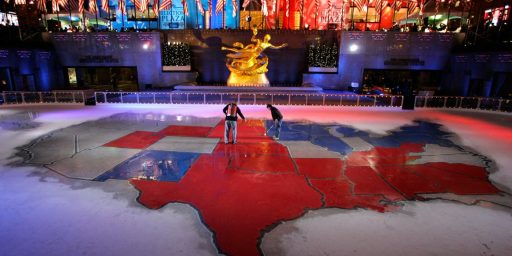

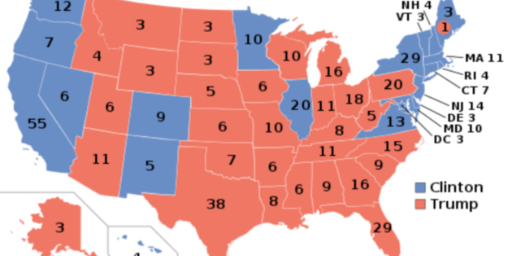
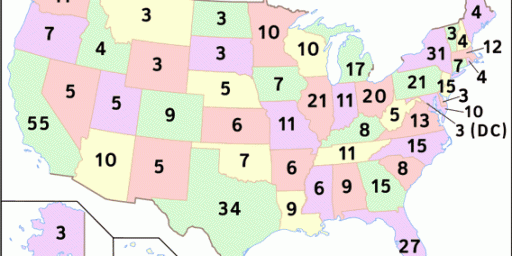
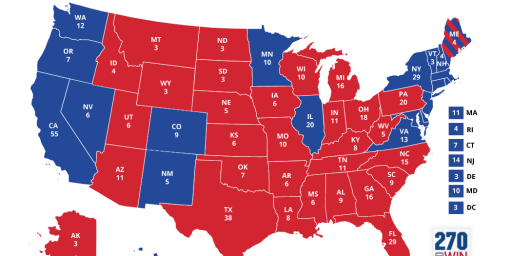
It’s impossible to argue our system hasn’t turned out radically different than many Founders had hoped. Politically, economically, I also imagine they would be shocked.
Regardless of the merits of the National Popular Vote idea or of the Electoral College, it’s worth noting that there are some potential Constitutional issues with NPV that will likely be litigated in the event the NPV gets to its goal of having states representing a majority in the Electoral College.
Specifically, Article I, Section 10, Clause 3 states that “No State shall, without the consent of Congress…..enter into any Agreement or Compact with another State….”
The NPV seems to clearly fall within the definition of an interstate compact, meaning that it would require Congressional assent. At the very least we can expect this issue to be litigated if and when NPV ever gets to that 270 state threshold.
On that note, it’s worth noting that the vast majority of states that have already passed the NPV are blue states. One suspects it will have some difficulty in states controlled by Republicans.
@Doug Mataconis:
Section 10. And, yes, the NPV initiative itself relies on the fact that states form inter-state compacts all the time, thus admitting that it is indeed such a compact. FindLaw’s Annotated Constitution parses the legal and legislative history of the clause, though, and certainly gives the impression that Congressional consent is not a significant obstacle.
Perhaps the fact that the compact would redound to the benefit of Democrats would be a problem in the present Congress, although the NPV is (to put it mildly) unlikely to come to pass before the 2018 midterms. (It’s not obvious to me how the provision works; presumably, it’s much like a treaty. That is, I don’t think POTUS has a say in the matter, much less a veto.)
@James Joyner:
Yea I was looking at the text of Section 10 when I wrote that comment and I still wrote Section 9. Obviously, the coffee has not kicked in yet, In any case, I went back and fixed the original comment.
In any event, the Constitution appears to be silent on the issue of Presidential assent to an Interstate Compact so I would argue that, much like a Constitutional Amendment, it is not necessary although there have been some instances in the past where a President has symbolically signed off on an Amendment that has received the required 2/3 vote in the House and Senate before it is sent to the state. As far as the Constitution is concerned, though, a President can’t “veto” a Constitutional Amendment or prevent it from going to the states if it gets the required majorities in Congress. I assume the same is true with regard to an Interstate Compact.
@Doug Mataconis:
Why ever would that be? (dripping with sarcasm)
@OzarkHillbilly: @Doug Mataconis: Oddly, a number of prominent Republicans, including Newt Gingrich, are big supporters of the initiative. But, yes, the setup currently favors Republicans. That’s not a permanent fact, however. Once upon a time, California was a solidly Republican state, now it’s the opposite. In the not-too-distant future, Texas could flip, too. At that point, Republicans would presumably be more likely to favor moving to NPV and Democrats, well, less.
@Ben Wolf: “shocked”: can you imagine what Jefferson would say if he could see things today? Also, Franklin, Adams, and Hancock?
This whole article points up the need for a big change. And that could very well happen. There is a ground level movement to change things. To restore Constitutional government. This would power where it is supposed to be instead of in the unchecked federal bureaucracy and federal courts. This movement is the Convention of States.
@Tyrell:
A Constitutional Convention would be a dangerous an foolish undertaking.
@James Joyner:
I don’t think you need Texas to flip. Just wait for a Democratic candidate to win the Electoral College, while getting 0.01% fewer votes than their Republican opponent, and the GOP will insist on popular vote presidential elections.
The pundits didn’t take it up, but back in 92 a lot of Bush supporters were majorly upset that Clinton was awarded the presidency when he didn’t win a majority of the popular vote (note: he did get more votes than Bush the elder).
@Tyrell:
And therein lies the problem: what does that mean? (Short answer: it is a nonsensical statement). Indeed, this post underscore the point: the EC was, as James notes, designed for the politics of 1789 and it never functioned as designed–so what would we be restoring?
For one thing: the document was originally designed for a system of limited suffrage (males only, and often with property requirements) as well as chattel slavery. Are we going to restore those conditions as well so as to have authenticity?
And, weirdly, a government in 2018 has a number of more complex issues to address than one did in 1789.
Are we going to do away with the standing army (which the Framers did not want–check the constitution)? How about the interstate highway system (which really took a creative approach to federalism)?
@Steven L. Taylor: “For one thing: the document was originally designed for a system of limited suffrage (males only, and often with property requirements) as well as chattel slavery. Are we going to restore those conditions as well so as to have authenticity?”
Those aspects were changed by the process of amending the Constitution. Is there a reason why abolishing (or even bypassing) the Electoral College wouldn’t require a similar effort?
@Warren Weber:
I was addressing Tyrell’s “restore constitutional government” comment–partially to note that any call for “restoration” has to take a lot of unpleasant facts into consideration (even the fact that we really did not have universal suffrage in the US until 1965).
Of course, even to your point about suffrage–since women didn’t get the right to vote until the early 20th century, is that the proper restoration point for Tyrell? I am guessing not.
In regards to the EC, I would prefer a constitutional amendment that shifted us to a popular vote with an absolute majority requirement. I am skeptical of the NPV initiative, although at this point think it may be the only route we have.
If there was a high likelihood of a CC happening I would seriously be looking at my expatriation options. No good would come of that. As flawed as the original document is, the 2018 rewrite would be a shitshow.
@Doug Mataconis:
In theory, the states with the strongest incentives to resist the NPV are the purple states, because those are the states that hold the balance of power in presidential elections under the EC, a status they would lose under an NPV system. Hard-red states like Alabama and Louisiana, which are currently just as ignored by the candidates as hard-blue states like California or Maryland, would actually gain power under an NPV system.
The supposed pro-Republican tilt of the EC is ephemeral and could easily change. Indeed, a lot of people don’t realize that in 2012, the Dems had the EC advantage and were much likelier to win the EC while losing the popular vote than the other way around. For a period of weeks, Mitt Romney appeared to be leading the national vote while trailing in the states he needed to win. In the end Obama ended up winning both the popular and EC vote by a significant margin (but not before Donald Trump wailed on Twitter that the EC was a “disaster for democracy”), but his hold on the EC was stronger than his hold on the popular vote. For Romney to have won the election, he would have had to win at least one state that Obama won by more than 5 points–yet Obama’s national lead was only 3.9. In other words, winning the EC would have been a steeper climb for Romney than winning the popular vote. Nate Silver estimated that if the popular vote had swung in Romney’s direction, he could have won it by as much as 1.5 points and still been in strong danger of losing the EC.
There’s no intrinsic ideological reason for Republicans to support the EC, but the experiences of 2000 and 2016 have led many of them to incorporate a pro-EC perspective into their worldview. From what I’ve seen the faux-Constitutional arguments are much likelier to be voiced by Republicans than Democrats. And it falls into the larger pattern where Republicans oppose reforms that move the system closer to one-person, one-vote–whether it concerns the EC, gerrymandering, or their myriad attempts to make voting more difficult. In this situation it’s hard to convince them they’ll truly benefit from an NPV, because they think of themselves as being locked in a zero-sum game with Democrats, and they’re bound to view such arguments with the same suspicion as they did toward immigration reform.
Flip 59,301 votes in Ohio in 2004, and Kerry would have been elected President despite having almost 3 million less votes than Bush.
How will delegates to this Convention be chosen? Doesn’t say.
How will drafts of Amendments be presented to the Convention?
Will States be limited to 10 submissions, 50?, 100?
What’s to stop a faction of Know Nothings to try to abolish the Supremacy of the current Charter in favor of divine rule by their Oracle Trump?
@Steven L. Taylor: Are we going to do away with for-profit corporations as Jefferson wished (I can only dream)? Will we radically and frequently redistribute property as Adams wished? Will we ensure the end of “immoderate and, especially, unmerited wealth” as Madison advocated? Somehow I doubt it.
@PJ: “Flip 59,301 votes in Ohio in 2004, and Kerry would have been elected President despite having almost 3 million less votes than Bush.”
If only Kerry was smart enough to sell out the country to Russia, he could have been president, too…